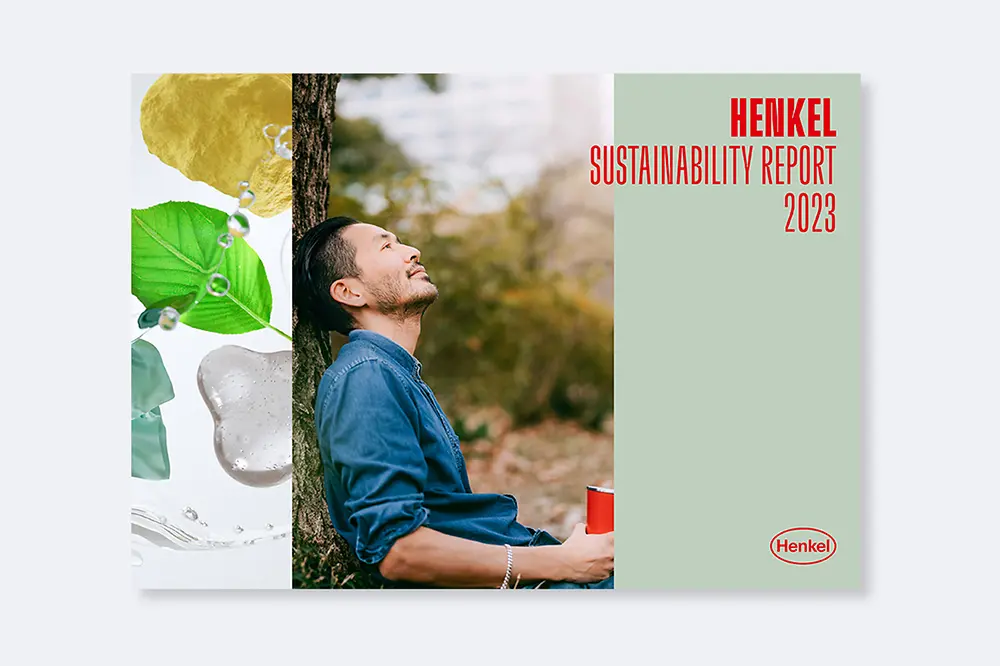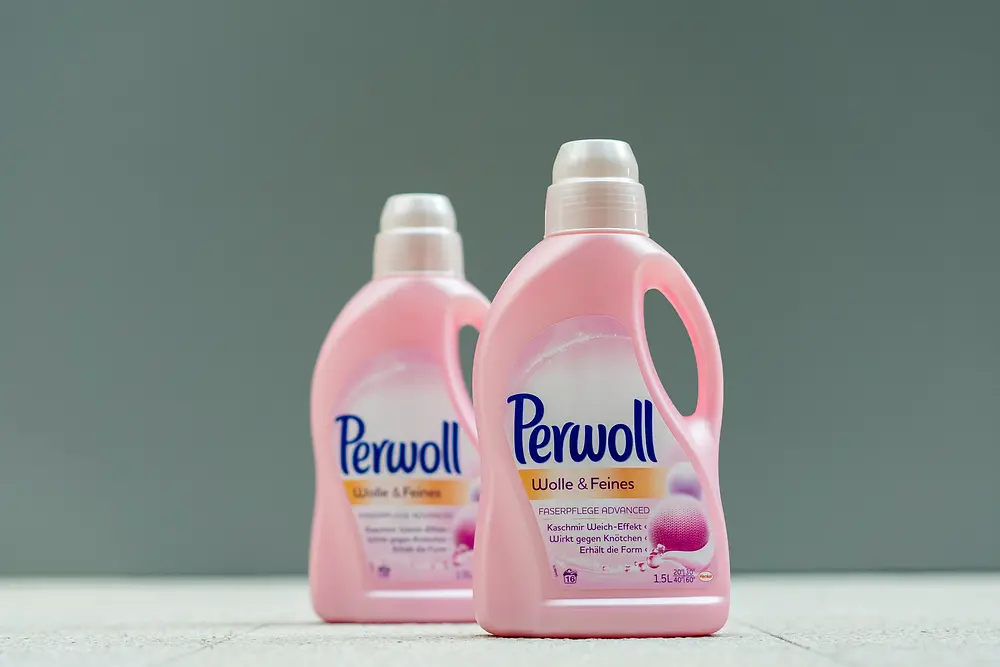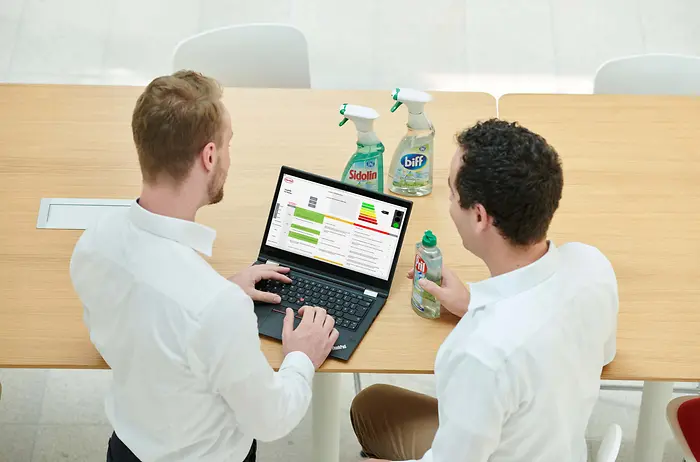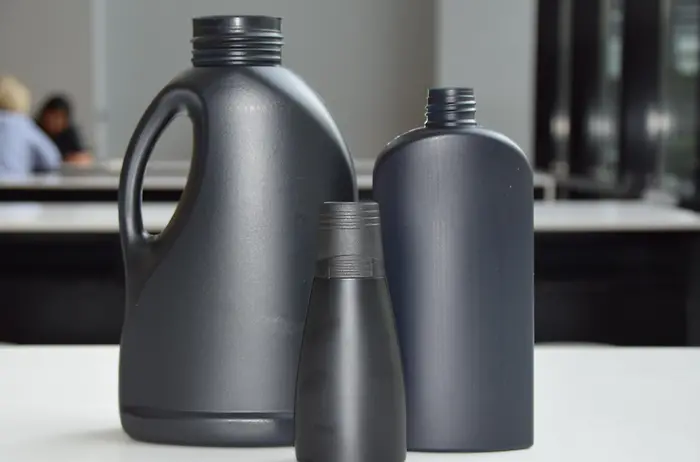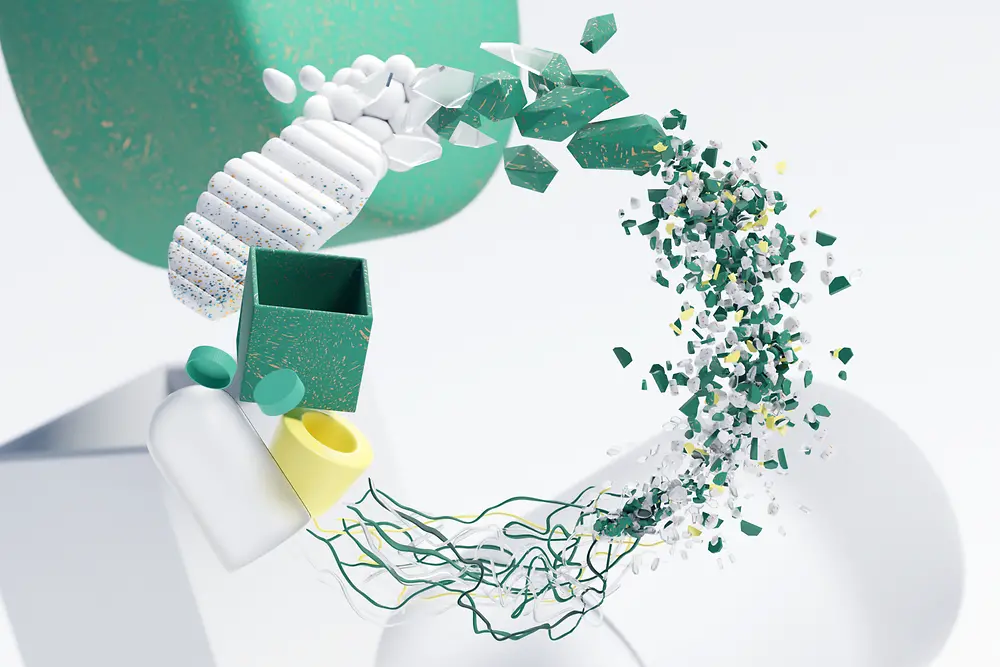Discover the brands and technologies from our business units Henkel Adhesive Technologies and Henkel Consumer Brands.
17 Oct 2019 Düsseldorf / Germany
First Henkel bottles made of chemically recycled plastic
For the first time, Henkel has produced bottles using chemically recycled plastic in collaboration with packaging manufacturer Alpla. Through chemical recycling, mixed plastic waste that was previously impossible to recycle can be effectively reprocessed and reused. The pilot project with bottles of Perwoll is part of the ChemCycling project led by BASF.
“We see huge potential for chemical recycling to complement conventional mechanical recycling,” said Dr. Thorsten Leopold, Head of International Packaging Development Home Care at Henkel. “Mechanical recycling is limited by the fact that not all plastic waste can be reprocessed into useable material. Thanks to chemical recycling, fossil resources can be replaced with recycled material made from plastic waste. This project is an important additional step towards creating a circular economy for plastic – on this basis we are evaluating further opportunities for integrating chemically recycled plastic in our product packaging.”
“The pilot project with Henkel’s Perwoll bottle has shown that products made using chemically recycled raw materials boast the same high quality and performance as products made of fossil materials. With ChemCycling, the proportion of recycled material that goes into the production process is assigned to the end product by the Mass Balance method. This can help our customers achieve their sustainability goals,” said Anja Winkler, BASF Head of Global Key Account Management Henkel Home & Personal Care.
“Through chemical recycling the resource plastic can be durably retained within the material cycle – the carbon it contains can thereby be reused. This is how chemical recycling could complement established technologies like mechanical recycling. The quality of the materials tested has convinced us,” said Nicolas Lehner, Chief Commercial Officer for Alpla.
Chemical recycling as a useful complement
Mechanical recycling involves crushing, cleaning and reprocessing separated plastic waste back into granulate form. The challenge inherent to this method is that the quality of the resulting recycled product can only be as good as that of the “input material”. Impure plastic, as well as color and a mix of materials can negatively impact the quality of the recycled product and make the recycling process more difficult. In addition, plastic cannot be reprocessed endlessly through mechanical recycling. Chemical recycling allows plastic waste that can’t be recycled mechanically to be reintroduced into the material cycle. ChemCycling uses thermo-chemical processes to transform plastic waste into pyrolysis oil. This secondary raw material then serves as feedstock for the chemical industry to produce plastic for various purposes, such as packaging. The packaging produced using these chemically recycled materials is of the same quality as packaging made of new plastic. This allows fossil resources to be saved and waste to be reduced.
Commitment to a circular plastic value chain
The collaboration with BASF and Alpla on the ChemCycling project is yet another example of Henkel’s commitment to sustainable packaging. The company has already reached various milestones in the implementation of its packaging strategy: many product packages today are made of 100 percent recycled plastic. When integrating recycled plastic in its packaging, Henkel uses 99 percent of recycled plastic from consumer households (post-consumer recycled material). In addition, Henkel’s packaging experts are working on improving its packaging’s recyclability: for instance, they developed the first recyclable black packaging and introduced perforated sleeves that can easily be removed when disposing the bottle. Most recently, Henkel made its software tool for evaluating the recyclability of packaging (EasyD4R) – which was developed in-house – available to other companies for free.
To drive progress towards a circular economy, Henkel is also partnering with various players across its value chain: among others, the company is a member of the German Rezyklat-Forum, the global Alliance to End Plastic Waste (AEPW) and the New Plastics Economy (NPEC).
Presentation at the K2019 trade fair
Dr. Thorsten Leopold from Henkel will be presenting the pilot project together with BASF during a live talk at the K2019 trade fair in Düsseldorf on October 23, 2019, stand C21/D21, hall 5.
Visit www.henkel.com/plastic for more information about Henkel’s progress and activities in the field of plastic.
The first Perwoll bottles from chemically recycled plastic – the pilot project is part of the ChemCycling project led by BASF.
